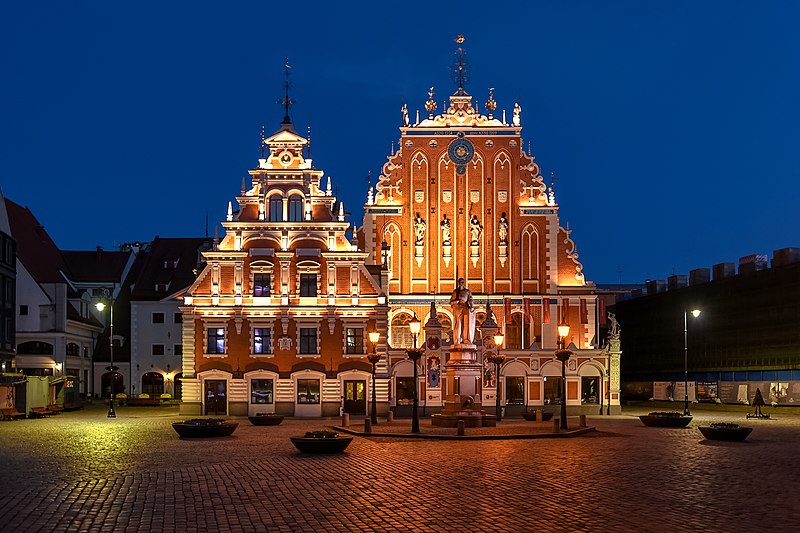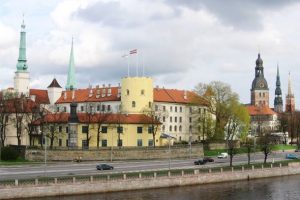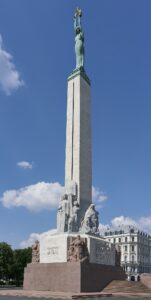
The New York Times on Those Repressive Lativans
My piece, “The New York Times on Those Repressive Latvians” was published by The American Spectator on 25 December 2023, and is reprised here by kind permission of the editors.
Latvians in the crosshairs
“In a Baltic Nation, Fear and Suspicion Stalk Russian Speakers,” announced The New York Times on December 18th: “In response to the war in Ukraine, Latvia has targeted residents with Russian passports as part of efforts to combat Moscow’s influence.”
The Times told of two Russian-speaking residents who were informed they must leave the country. The first was born in Latvia 63 years ago. The second arrived to work in a Soviet factory in 1980, and took Russian citizenship to get early retirement benefits. When Latvia regained independence in the 1991 “Singing Revolution,” it “denied full citizenship to some Russian speakers because they could not pass a Latvian language test. They were issued ‘noncitizen’ passports, a status that allowed them to travel and guaranteed residency and full access to health care and social benefits. But it shut them out from many government jobs and national politics.”
The article does mention arguments favoring Latvia’s policies. Jānis Dombrava, a member of the Saeima (Parliament) says: “We can keep those who want to integrate but not those who are waiting for the return of the Soviet Union. They should leave.”
The Times also provides comments by the kind and understanding Russian state media: Latvia is a “fascist-led country of Russophobes intent on creating a mono-ethnic state.” Vladimir Putin said Russian speakers are treated “like pigs.” Latvia, he adds, is preparing to dump them on Russia’s border “in wheelchairs.” This, he warned, would only lead “to clashes within their own country.”
All the news that’s fit to tint
The Times story was misleading in that it cited two examples out of thousands. It found both in Daugavpils, the closest Latvian city to Russia, where 80% of the populace is Russian-speaking. Yet after the article’s early scare paragraphs, we learn that one woman passed the language test and had her residency restored. The other woman, who didn’t pass, has not been expelled. Nor, despite “a maze of bureaucracy,” have any others.
“We are not rushing to expel anyone,” says Ilze Briede, the head of Latvia’s migration department. Nobody, she adds, has been deported or is likely to be anytime soon. The deadline for compliance has been extended until 2025.”
So, before we fix the charge of ethnic cleansing and a new form of Aryan supremacy reminiscent of the Third Reich, perhaps we should consider reality. With Latvian forebears and having spent time there, this writer may have some to offer. (I visited just after independence, then bicycled the 400-mile coast from Lithuania to Estonia a few years later.)
The other side of the story

1) Latvia is a country where, as Churchill said, the people own the government, not the government the people; where they elect representatives to govern them; where they may say what they like and worship as they please. That makes them “people like us.” (Ukraine, by the way is none of those things—if banning opposition parties, shutting Orthodox churches, and muzzling the press are any indicators.) Latvia is also a NATO member. Judge that based on where it takes you.
2) Latvia is a welcoming country, and not just to tourists. Proportionately, it has admitted more Ukrainian refugees than the United States: 32,000 to 220,000. Their number is proportional to 560,000 in America. Ukrainians are now the fourth largest ethnic group after Latvians, Russians and Belarusians.
3) Latvia’s situation is not just 50,000 Russian speakers in Daugavpils. It’s broader than that. When they regained independence, 40% of the population was ethnic Russian—the product of 50 years of Communist oppressors shuffling Russians in and Latvians out. It’s now down to 24% (450,000)–not through pogroms or deportations but because many Russians went home when Communism ended and Latvia reestablished its native language. (Yes, there is a language test for full citizenship, but only in basic conversational Latvian.)
War and remembrance
The Times is right about one thing: Latvians have long memories. On my first visit, I met a veteran of the Latvian Legion (organized by the Germans to fight the Russians, which they did, to a standstill in May 1945). He showed me flat farmland where they dug in against oncoming Soviet tanks—Shermans acquired by Lend-Lease, their white stars hastily repainted red. “But why did you fight with the Nazis?” I asked. “You have to remember,” he said sadly: “We had to choose between barbarians.”
On my second visit, we talked history with Mayor Teodors Eniņš of the coastal city of Liepāja (pronounced “Lee’-a-pie”). When I said “Churchill” he said “Yalta”—the fateful summit conference that had confirmed Soviet rule of Eastern Europe. The conversation drifted into “a frank exchange of views,” as the diplomats put it.
“You should have nuked them in 1945,” the mayor said quietly. Taken aback, I remonstrated. “We left Yalta with promises of free elections. It was all we could hope for. The Red Army held half the continent. The only alternative was war. No one would have that.
“Moreover” (warming to my subject), “things could have been worse. Greece—thanks to Churchill’s “percentages agreement” with Stalin in 1944—was liberated. Stalin agreed to fight Japan.” Mayor Eniņš was undeterred. “You should have fought them,” he repeaatead. “Think of all the trouble you would have saved yourselves—not to mention us.”
As we stood to leave, he pulled up his shirt, showing scars across his stomach. As a boy, he and his mates would visit the barb-wired beaches after curfew, walking backwards into the water to simulate an invasion. He’d been strafed by Soviet guards. “They had guns and dogs.” How you think about these things often depends on how you grew up.
Peace and tolerance

Given such attitudes, you might think Latvians would hate Russophones, but you’d be wrong. The historian Owen Rutter wrote of the republic in 1925: “To anyone who had seen the Latvian people at war, their gentle tolerance in peace was perplexing. By the brutally intolerant standards so common in the world now, one would expect the Latvians to have deported all the Baltic Germans, levied discriminatory taxes on the Jews…. Instead they pronounced amnesty for those who had fought against them [and offered] minorities full citizenship and free education.”
There were remarkable reforms: by allowing women to vote during the momentary Russian elections in 1905, Latvia became the first district in Europe with female suffrage; this continued during Latvia’s independence. The recent comments by Jānis Dombrava and Ilze Briede show this attitude remains.
It’s odd, don’t you think? We never read any articles about Latvians scattered across Russia, who never got home because of “a maze of bureaucracy,” or other reasons. They don’t fit the Times narrative—which seems always that civilized democracies are as bad as all those other countries.
The Times even declares that according to German pollsters, 53% of Russian speakers in Latvia view Putin negatively. You could probably better that number if you asked Russian speakers in Russia—provided they dared give an honest answer.
Related articles
“Churchill and the Baltic States: From the Second World War to Liberation,” 2018.
“Churchill and the Baltic”: Part 1 of a four-part essay, Hillsdale College Churchill Project, 2017.






